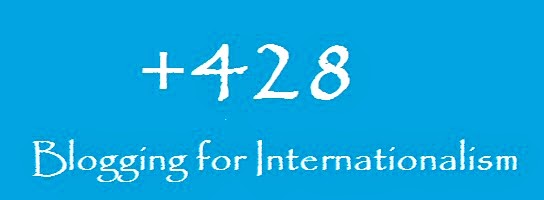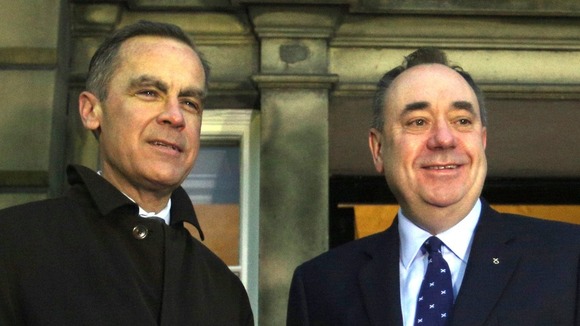Mark Carney and Alex Salmond
It is of no great surprise or worry that compromise has to be found in formalising a currency union. Yes, the UK government remains the main user of the Pound Sterling and the founding state of the Bank of England. But Scotland has a stake in the currency as well and most importantly it holds the cards on this issue. The UK government has indicated it may refuse a formal currency union but actually it is the UK government that will urgently feel the need for discussions with the other government for the formalisation of the common currency area.
It is important to understand this referendum is not a vote on what currency we use, it is a vote on the basic principal of independence. It is about the government of Scotland being able to hold constitutional referenda without the permission of Westminster. If there's a currency union and the Scots feel it's not working, Holyrood could allow for the holding of a referendum to decide if it should adopt a different currency. That, my friends, is sovereignty. Scotland can adjust its own circumstances to fit its own needs. The very fact that this possibility is opened up by indepenendece surely makes up for supposed 'ceding of sovereignty' in the currency union.
Pound sterling coinage from 2002.
When it comes to negotiating the currency union following a Yes vote Salmond could respond to any threats by Westminster by simply stating that Scotland will use it anyway and that as Westminster had decided that state-owned responsibilities were soley for the continuing UK to inherit and not co-inherit with Scotland it would be assumed that included national debt. Alistair Darling must have had the brain of an earthworm when he asserted that this was a threat of Scotland 'defaulting' on its debts. Yet it would only be following a principle Alistair Darling has claimed would be the case regarding Scotland as a new country not a co-inheritor. You can't just default on debt that you don't own any more than you can be accused of stealing an ice cream if someone else who was buying it on your behalf hasn't paid for it. Salmond has said he will take on a share of the national debt if Cameron agrees to a currency union. Surely Cameron would favour such a deal. But if he refuses he will face a difficult challenge because there is everything for Salmond to gain.
An informal currency union could work in two ways: one with a Scottish version of the same currency or the other with a different Scottish currency pegged to the Pound Sterling. In the case of the former, the Scottish government could just mint coins that look like pound sterling and allow Scottish businesses to trade with Sterling and the Scottish pound interchangeably like happens in the Isle of Man already. The Scottish currency could easily be called the Pound using the £ symbol since neighbours Canada and the USA each use their own currency and both are called the Dollar ($). If you are ever paid with a Manx pound coin do you return it to the user and ask that they give you a British coin? No, you wouldn't, you would accept it like any other pound coin. It might be different with a Manx banknote but even that could be changed at your local bank for a British banknote. The same would apply potentially with Scottish banknotes but that already happens now even though it's Sterling with numerous traders in England rejecting any Scottish banknotes. The Bank of England may not underwrite a Scottish banknote but it can always be traded with the same value in coins in many places. Banks south of the border may likely have a policy of changing Scottish banknotes so long as there's certainty there will be no imminent devaluing.
Manx coinage - look familiar?
I personally feel an independent Scotland should retain the pound at least in the first few years of independence. To rush into adopting a completely different currency without any due consideration or public consultation would be irresponsible. To properly debate the issue of currency we should first be independent. And then we assess the current climate and decide where we proceed from there. Why should we even decide what currency an independent Scotland should use when the opinions of unionists are not being expressed? Alistair Darling is prepared to dictate what the opinions of pro-independence people should be, as though to support a Sterling-zone in an independent Scotland is to not be true to your beliefs. Yet if there is a Yes vote would Alistair Darling support continued use of the pound or the creation of a new currency? From what he has indicated he would favour the former. If that is the case why is trying to discourage pro-independence campaigners from that very viewpoint when come the 19th September and the confirmation of a Yes vote we would all be in exactly the same position of needing to formulate a vision of an independent Scotland? In a modern democracy we should be encouraged to express diverging opinions even within the same camp. If Alistair Darling can't respect that he should just get lost.
The unilateral use of Sterling by Scotland would force the ball into David Cameron's court. Money being entered into circulation in Scotland will be part of the £ Sterling slip stream with David Cameron having absolutely no say in the matter. This could have some effect on the UK economy and if it concerns Cameron it will be down to him to approach the other government. Then if Cameron wants a formal currency union with Scotland he will have to agree to conditions set by Alex Salmond which may include the repatriation of territorial waters between Berwick and Carnoustie or the sharing of gold reserves or both as well as fair representation in the Bank of England. Given Scotland's wealth Salmond will have the upper hand. And if the informal currency union is of no concern to David Cameron then it's of no concern to Alex Salmond either.
Actually that might not be a bad idea!
Better Together has demanded 'the SNP' reveal a Plan B if the formal currency union fails. Well as a card-carrying member of the SNP let me answer that one: Plan B is that we mint our own pounds and peg them to Sterling while accepting Sterling in everyday trade. If this is something for the UK government to fear they had better start offering the Scottish Government a reasonable deal in taking forward a formal pact. Because if at any point the Scottish Government feels Westminster is letting the economy down to the detriment of the Pound Sterling and businesses on both sides of the border they can choose to end the par with Sterling and exercise the right to control the value of the Scottish pound.
In relation to the formal currency union we can all agree there will be a need for compromise. But this is where debate ends and individual judgement begins. Because what has to be born in mind is that for all we may have to give up for gain a currency union the prize is the Scottish Parliament having control over so many new areas. Control over welfare. Control over whether or not nuclear weapons are based in Scotland. Control over our foreign military engagements. Control over Air Passenger Duty. Control over the minimum wage. These are things Johann Lamont calls 'wee things'. But I would leave it to the people of Scotland to be the judge of whether these are 'wee things' or in fact the big issues.





No comments:
Post a Comment